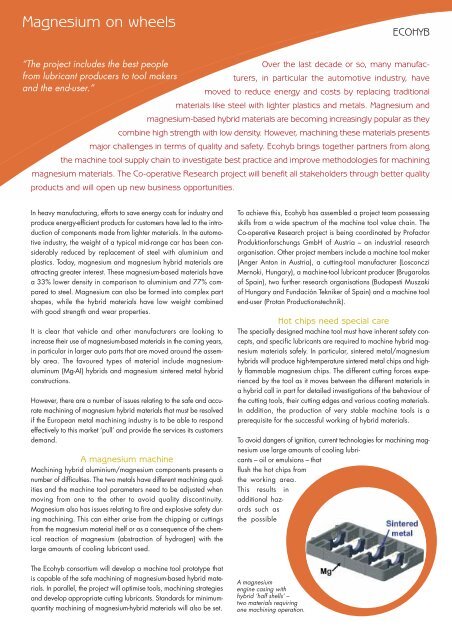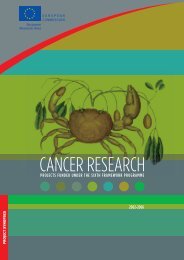Co-operative Research projects for SMEs - European Commission ...
Co-operative Research projects for SMEs - European Commission ...
Co-operative Research projects for SMEs - European Commission ...
Create successful ePaper yourself
Turn your PDF publications into a flip-book with our unique Google optimized e-Paper software.
Magnesium on wheels<br />
“The project includes the best people<br />
Over the last decade or so, many manufac-<br />
from lubricant producers to tool makers<br />
turers, in particular the automotive industry, have<br />
and the end-user.”<br />
moved to reduce energy and costs by replacing traditional<br />
materials like steel with lighter plastics and metals. Magnesium and<br />
magnesium-based hybrid materials are becoming increasingly popular as they<br />
combine high strength with low density. However, machining these materials presents<br />
major challenges in terms of quality and safety. Ecohyb brings together partners from along<br />
the machine tool supply chain to investigate best practice and improve methodologies <strong>for</strong> machining<br />
magnesium materials. The <strong>Co</strong>-<strong>operative</strong> <strong>Research</strong> project will benefit all stakeholders through better quality<br />
products and will open up new business opportunities.<br />
In heavy manufacturing, ef<strong>for</strong>ts to save energy costs <strong>for</strong> industry and<br />
produce energy-efficient products <strong>for</strong> customers have led to the introduction<br />
of components made from lighter materials. In the automotive<br />
industry, the weight of a typical mid-range car has been considerably<br />
reduced by replacement of steel with aluminium and<br />
plastics. Today, magnesium and magnesium hybrid materials are<br />
attracting greater interest. These magnesium-based materials have<br />
a 33% lower density in comparison to aluminium and 77% compared<br />
to steel. Magnesium can also be <strong>for</strong>med into complex part<br />
shapes, while the hybrid materials have low weight combined<br />
with good strength and wear properties.<br />
It is clear that vehicle and other manufacturers are looking to<br />
increase their use of magnesium-based materials in the coming years,<br />
in particular in larger auto parts that are moved around the assembly<br />
area. The favoured types of material include magnesiumaluminum<br />
(Mg-AI) hybrids and magnesium sintered metal hybrid<br />
constructions.<br />
However, there are a number of issues relating to the safe and accurate<br />
machining of magnesium hybrid materials that must be resolved<br />
if the <strong>European</strong> metal machining industry is to be able to respond<br />
effectively to this market ‘pull’ and provide the services its customers<br />
demand.<br />
A magnesium machine<br />
Machining hybrid aluminium/magnesium components presents a<br />
number of difficulties. The two metals have different machining qualities<br />
and the machine tool parameters need to be adjusted when<br />
moving from one to the other to avoid quality discontinuity.<br />
Magnesium also has issues relating to fire and explosive safety during<br />
machining. This can either arise from the chipping or cuttings<br />
from the magnesium material itself or as a consequence of the chemical<br />
reaction of magnesium (abstraction of hydrogen) with the<br />
large amounts of cooling lubricant used.<br />
The Ecohyb consortium will develop a machine tool prototype that<br />
is capable of the safe machining of magnesium-based hybrid materials.<br />
In parallel, the project will optimise tools, machining strategies<br />
and develop appropriate cutting lubricants. Standards <strong>for</strong> minimumquantity<br />
machining of magnesium-hybrid materials will also be set.<br />
To achieve this, Ecohyb has assembled a project team possessing<br />
skills from a wide spectrum of the machine tool value chain. The<br />
<strong>Co</strong>-<strong>operative</strong> <strong>Research</strong> project is being coordinated by Profactor<br />
Produktion<strong>for</strong>schungs GmbH of Austria – an industrial research<br />
organisation. Other project members include a machine tool maker<br />
(Anger Anton in Austria), a cutting-tool manufacturer (Losconczi<br />
Mernoki, Hungary), a machine-tool lubricant producer (Brugarolas<br />
of Spain), two further research organisations (Budapesti Muszaki<br />
of Hungary and Fundación Tekniker of Spain) and a machine tool<br />
end-user (Protan Productionstechnik).<br />
Hot chips need special care<br />
The specially designed machine tool must have inherent safety concepts,<br />
and specific lubricants are required to machine hybrid magnesium<br />
materials safely. In particular, sintered metal/magnesium<br />
hybrids will produce high-temperature sintered metal chips and highly<br />
flammable magnesium chips. The different cutting <strong>for</strong>ces experienced<br />
by the tool as it moves between the different materials in<br />
a hybrid call in part <strong>for</strong> detailed investigations of the behaviour of<br />
the cutting tools, their cutting edges and various coating materials.<br />
In addition, the production of very stable machine tools is a<br />
prerequisite <strong>for</strong> the successful working of hybrid materials.<br />
To avoid dangers of ignition, current technologies <strong>for</strong> machining magnesium<br />
use large amounts of cooling lubricants<br />
– oil or emulsions – that<br />
flush the hot chips from<br />
the working area.<br />
This results in<br />
additional hazards<br />
such as<br />
the possible<br />
A magnesium<br />
engine casing with<br />
hybrid ‘half shells’ –<br />
two materials requiring<br />
one machining operation.<br />
ECOHYB

















